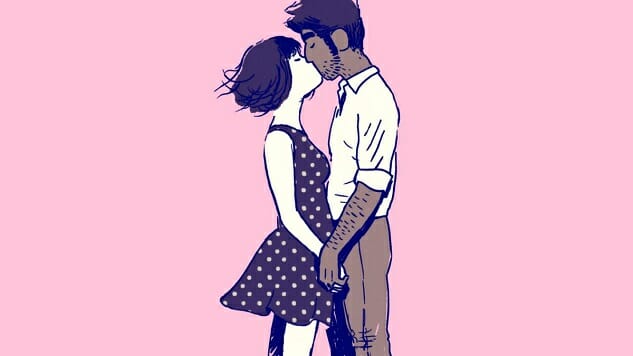
Florence is the rare game where the metaphor lies directly in the mechanics. Florence, an accountant in her mid 20s, is a lonely young woman, bored and going through the motions of her life, until she one day meets a musician named Krish. As the chapters progress, they move through the classic goalposts of a relationship, the ups and downs we’ve all experienced in the course of finding love. And as it comes to its heartbreaking and inevitable conclusion, it ends with a surprise: Florence moves on, and she is okay.
While many interactive stories seem to rely on clever formatting to almost justify their description as a videogame, Florence uses them to more to establish or reinforce the point of each scene or chapter, illustrating the passage of time, the inanity of a daily routine, or the difficulty of constructing a reply during a conversation. In one scene I took my time carefully selecting items in Florence’s apartment to go into storage and choosing which of Krish’s belongings to put on the shelves. Post-breakup, I had to then pack away all those things I’d so lovingly made room for into a box. Tears came to my eyes. They returned later, as Florence and Krish parted. Then again as she learned, finally, to let go and walk away. And finally again at the end, when she picks up the watercolors he once bought her, circling back to her childhood passion and finding redemption in a new skill and profession. The final shot, of Florence smiling at an old photo of her days with Krish, hints that she now looks on those days with fondness, and appreciates the brief time for what it was.
It’s been an interesting time in my life to come across Florence. The five year anniversary of my first trip to GDC was just a few short weeks ago, and I spent a lot of time thinking about the fling I had all those years ago, which I wrote about, in my first-ever article for Paste, after playing Firewatch. I wound up booking the same hotel, with the same tiny room I’d brought the man I called F, the subject of that old article, back to in 2013. I spent hours in the same restaurant where we’d dined with Notch on tapas and beer. I walked past the sidewalk where I broke my phone and remembered the little pipe he’d bought me on Market. I thought a lot about how, at the end of the week, he asked if we could be together and then, 24 hours later, changed his mind. In general, it was a trip haunted by what never was but could have been.
As I wrote years later, it’s rare that you come across a piece of media that encourages and models healthy relationship behavior. It speaks to the sheer oversaturation of certain redemptive narratives in romantic fiction that I expected the game to end with Florence and Krish getting back together. And when I found myself super bummed out that they didn’t, I had to examine briefly why that is—why I, too, sometimes need that redemptive narrative, and why I held onto hope in so many relationships where there was none. There are many situations I’ve never healed from because I simply refused to let go; Florence, as it were, has a mechanical metaphor for that too. It was easier on screen in the game than it is in real life.
He was at GDC this year. I didn’t expect to see him, or that he’d be a speaker again, or that we’d walk past each other on the first floor of the West Hall at Moscone Center early in the week. But he was and we did. His eyes lit up as he spotted me in the crowd, and I saw him lift his head to call my name as I mouthed the words, “I’m sorry”, and kept going. I texted him shortly after, “Apologies for blowing by you, I really needed to get to the bathroom”, which wasn’t a lie. But I left out the rest. Truth be told I just couldn’t sit through another conversation where he seemed so oblivious to how much he hurt me.
I guess I thought with all this time passed, having stuck to my guns and the boundaries I set years ago, that I was over it. But the neat, Holly Green-shaped outline I left in a wall as I parkoured to the ladies’ room suggests I’m not. I’m aware, on some level, that the offense I feel is a choice, a defense mechanism in the interest of assessing risk and keeping my heart safe. So maybe the distance I’ve established is healthy. Then again, maybe I’ll have truly moved on when I choose not to punish him, or myself, with my pain anymore.
Florence is refreshing in that it frames a past relationship not as a failure, but rather, an event that can be cherished even if it doesn’t end on ideal terms. Its redemption narrative is based not on trying to salvage what might not be worth saving, but of growing and moving on. It’s an empowering message amid so much romantic fiction that encourages women to self doubt, self neglect, and suffer for love. And it reminds me that I can make the decision to be okay.
Holly Green is the assistant editor of Paste Games and a reporter and semiprofessional photographer. She is also the author of Fry Scores: An Unofficial Guide To Video Game Grub. You can find her work at Gamasutra, Polygon, Unwinnable, and other videogame news publications.